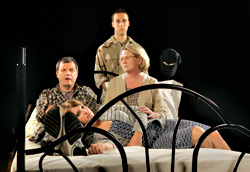Friday’s world premiere from the volcanically creative semi-Seattleite playwright Craig Lucas was a paradox. Word by riffing, raffish word and moment by riveting moment, Prayer for My Enemy is one of the better shows I’ve seen in 30 years. It’s only as a bizarrely structured whole that the show blows—and yet you walk out hugely amused and deeply moved.
Lucas ambitiously attempts to sum up how we live now—to depict the American family beset by civil war in Iraq (and in our own living rooms), with special attention to bisexuality, bipolar madness, TV and drug addiction, road rage, autism, city-suburb hubbub, and the codependent hoedown. He tackles everything from naked mole rats underground to God in heaven.
It’s a rush, but the dots only connect in an abstract way. The central conflict between crazy, dry-drunk Viet-vet Austin Noone (John Procaccino) and his son Billy (Daniel Zaitchik) doesn’t work, despite solid acting. Billy enlists for Iraq to prove he’s a man; Austin calls him an effeminate fag. Their relationship just doesn’t gel onstage—it’s schematic, not dynamic.
What works great is Billy’s galvanic relationship with Tad (James McMenamin), his first love, whom he re-meets by chance and invites to his family’s Iraq going-away backyard barbecue. Tad has the loopy spark of a Joe Orton hero, only less sinister. Sure, he’d like to fuck Billy and his whole clan, but he’s also a heartfelt love puppy, even when not gobbling Ecstasy. The guys manfully bond while denying the shrieking gay subtext of their palship, which erupts in things each thinks out loud but others don’t hear.
Most of the dialogue is complex counterpoint between what characters think and say. Thus we—and the cast—must navigate the characters’ rapid-fire spoken and unspoken dialogue and multiple points of view. It’s tricky, but so smoothly does Lucas write, Bartlett Sher direct, and the actors perform that it seems the soul of poetic naturalism.
Except for the inert father-son relationship, Lucas beautifully depicts family life, and not just around the grill. When Tad, Billy, and Billy’s sister (the excellent Chelsey Rives) share a joint together, it does more than send up stony philosophizing: It bonds them in a unit that feels like family. Later, Austin raves about an elephant documentary on TV: “They probably have a larger network of relationships than any land mammal. From miles away they hear, and the sounds have exact meanings—they can tell what one another are thinking!” Standing next to him, his daughter delivers a venomous anti-Dad philippic he can’t hear, and wouldn’t if he could. Nor would she ever violate the Noones’ vow of silence on their most urgent hurts.
Lucas adds to the superb subversive surrealism of a Harry Kondoleon or Eric Overmyer the propulsive, quippy drive of a movie master (he recently wrote The Secret Lives of Dentists). The ponderous, Socially Important passages about the war and life and God matter less than the sheer screwball seriocomic velocity. Prayer for My Enemy is like Arrested Development without the nihilism (or less of it, anyway).
In productions like Prelude to a Kiss and The Dying Gaul, Lucas has never lacked brass balls. For reasons unclear until the finale, he adds a whole second story line, intercutting the Noone saga with monologues by Manhattan transplant Dolores Endler (Kimberly King).
King is the true star of the show, and Dolores’ protracted rants anchor the Noones’ more scattershot drama. She’s one of those New York émigrés so vehement about hating the place that it’s clear she’s brought it with her. (As Austin could tell her, “Stay out of your head—it’s a bad neighborhood.”) Dolores gloriously reviles parking cops, her lox of a husband, her crazy, religious sister upstate (“Buddhist nuns in Albany, N.Y.—that’s like having, I don’t know, Kurdish rebels in Cleveland”). Her fiercely funny anger arias add up to a focused family portrait and a slam-dunk self-indictment. King is a coloratura of invective.
I wish I could say the collision of Dolores and the Noones is tragic, but it’s contrived. Austin’s downfall seems pasted on, and his climactic soliloquy sucks. The last act has its moments, though it’s as startlingly inconclusive as The Sopranos.
The characters won’t leave your head, however—partly because Sher has slightly sweetened and humanized them. Sher and Lucas are one of the great duos in American theater history, and it’s a privilege to witness the brilliant collision of their aesthetics.








